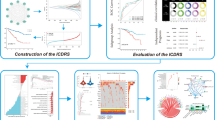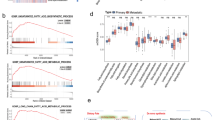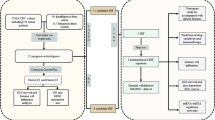Abstract
Pancreatic cancer (PC) is one of the most common malignant tumors in the world with a poor prognosis. There were limited studies investigating the genetic signatures associated with inflammatory responses, tumor microenvironment (TME), and tumor drug sensitivity prediction. In the Cancer Genome Atlas (TCGA) dataset, we constructed an inflammatory response–related genes prognostic signature for PC, and predictive ability of the model was assessed via the International Cancer Genome Consortium (ICGC) database. Then, we explored the differences of TME, immune checkpoint genes and drug resistance genes, and the cancer cell sensitivity to chemotherapy drugs between different risk score group. Based on the TCGA and ICGC databases, we constructed and validated a prognostic model, which consisted of 5 genes (including AHR, F3, GNA15, IL18, and INHBA). Moreover, the prognostic model was independent prognostic factors affecting overall survival (OS). The low-risk score group had better OS, and lower stromal score, compared with patients in the high-risk score group. The difference of antigen-presenting cells, T cell regulation, and drug resistance genes between different risk score groups was found. In addition, the immune checkpoint genes were positively correlation to risk score. The expression levels of AHR, GNA15, IL18, and INHBA were related to the sensitivity of anti-tumor chemotherapy drugs. Gene set enrichment analysis (GSEA) showed significant pathway such as calcium signaling pathway and p53 signaling pathway. We successfully constructed a 5-inflammatory response–related gene signature to predict survival, TME, and cancer cell sensitivity to chemotherapy drugs in PC patients. Furthermore, substantiation was warranted to verify the role of these genes in tumorigenesis.









Similar content being viewed by others
Data availability
The datasets analyzed for this study were obtained from The Cancer Genome Atlas (TCGA) (https://portal.gdc.cancer.gov/) and International Cancer Genome Consortium (ICGC) (https://icgc.org/).
References
Ansari D, Tingstedt B, Andersson B, Holmquist F, Sturesson C, Williamsson C, Sasor A, Borg D, Bauden M, Andersson R (2016) Pancreatic cancer: yesterday, today and tomorrow. Future Oncol 12:1929–1946
Blum R, Kloog Y (2014) Metabolism addiction in pancreatic cancer. Cell Death Dis 5:e1065
Canzler S, Hackermuller J (2020) multiGSEA: a GSEA-based pathway enrichment analysis for multi-omics data. BMC Bioinformatics 21:561
Charoentong P, Finotello F, Angelova M, Mayer C, Efremova M, Rieder D, Hackl H, Trajanoski Z (2017) Pan-cancer immunogenomic analyses reveal genotype-immunophenotype relationships and predictors of response to checkpoint blockade. Cell Rep 18:248–262
Chen ZL, Qin L, Peng XB, Hu Y, Liu B (2019) INHBA gene silencing inhibits gastric cancer cell migration and invasion by impeding activation of the TGF-beta signaling pathway. J Cell Physiol 234:18065–18074
Cheong JE, Sun L (2018) Targeting the IDO1/TDO2-KYN-AhR pathway for cancer immunotherapy — challenges and opportunities. Trends Pharmacol Sci 39:307–325
Croken MM, Qiu W, White MW, Kim K (2014) Gene set enrichment analysis (GSEA) of Toxoplasma gondii expression datasets links cell cycle progression and the bradyzoite developmental program. BMC Genomics 15:515
Dominguez C, David JM, Palena C (2017) Epithelial-mesenchymal transition and inflammation at the site of the primary tumor. Semin Cancer Biol 47:177–184
Fan Z, Luo G, Gong Y, Xu H, Qian Y, Deng S, Huang Q, Yang C, Cheng H, Jin K et al (2020) Prognostic value of the C-reactive protein/lymphocyte ratio in pancreatic cancer. Ann Surg Oncol 27:4017–4025
Ferlay J, Partensky C, Bray F (2016) More deaths from pancreatic cancer than breast cancer in the EU by 2017. Acta Oncol 55:1158–1160
Gheorghe G, Bungau S, Ilie M, Behl T, Vesa CM, Brisc C, Bacalbasa N, Turi V, Costache RS, Diaconu CC (2020) Early diagnosis of pancreatic cancer: the key for survival. Diagnostics (Basel) 10(11):869
Gheorghe G, Diaconu CC, Ionescu V, Constantinescu G, Bacalbasa N, Bungau S, Gaman MA, Stan-Ilie M (2022) Risk factors for pancreatic cancer: emerging role of viral hepatitis. J Pers Med 12(1):83
Greten FR, Grivennikov SI (2019) Inflammation and cancer: triggers, mechanisms, and consequences. Immunity 51:27–41
Hanzelmann S, Castelo R, Guinney J (2013) GSVA: gene set variation analysis for microarray and RNA-seq data. BMC Bioinformatics 14:7
Houot R, Schultz LM, Marabelle A, Kohrt H (2015) T-cell-based immunotherapy: adoptive cell transfer and checkpoint inhibition. Cancer Immunol Res 3:1115–1122
Huo J, Wu L, Zang Y (2021) Development and validation of a novel metabolic-related signature predicting overall survival for pancreatic cancer. Front Genet 12:561254
Innamorati G, Wilkie TM, Malpeli G, Paiella S, Grasso S, Rusev B, Leone BE, Valenti MT, Carbonare LD, Cheri S et al (2021) Galpha15 in early onset of pancreatic ductal adenocarcinoma. Sci Rep 11:14922
Kamisawa T, Wood LD, Itoi T, Takaori K (2016) Pancreatic cancer. Lancet 388:73–85
Kandikattu HK, Manohar M, Verma AK, Kumar S, Yadavalli CS, Upparahalli Venkateshaiah S, Mishra A (2021) Macrophages-induced IL-18-mediated eosinophilia promotes characteristics of pancreatic malignancy. Life Sci Alliance 4(8):e202000979
Kure S, Matsuda Y, Hagio M, Ueda J, Naito Z, Ishiwata T (2012) Expression of cancer stem cell markers in pancreatic intraepithelial neoplasias and pancreatic ductal adenocarcinomas. Int J Oncol 41:1314–1324
Lee BM, Chung SY, Chang JS, Lee KJ, Seong J (2018) The neutrophil-lymphocyte ratio and platelet-lymphocyte ratio are prognostic factors in patients with locally advanced pancreatic cancer treated with chemoradiotherapy. Gut Liver 12:342–352
Li S, Xu HX, Wu CT, Wang WQ, Jin W, Gao HL, Li H, Zhang SR, Xu JZ, Qi ZH et al (2019) Angiogenesis in pancreatic cancer: current research status and clinical implications. Angiogenesis 22:15–36
Lin Z, Xu Q, Miao D, Yu F (2021) An inflammatory response-related gene signature can impact the immune status and predict the prognosis of hepatocellular carcinoma. Front Oncol 11:644416
Lutz ER, Kinkead H, Jaffee EM, Zheng L (2014) Priming the pancreatic cancer tumor microenvironment for checkpoint-inhibitor immunotherapy. Oncoimmunology 3:e962401
Lyu S, Jiang C, Xu R, Huang Y, Yan S (2018) INHBA upregulation correlates with poorer prognosis in patients with esophageal squamous cell carcinoma. Cancer Manag Res 10:1585–1596
Manohar M, Verma AK, Venkateshaiah SU, Mishra A (2018) Role of eosinophils in the initiation and progression of pancreatitis pathogenesis. Am J Physiol Gastrointest Liver Physiol 314:G211–G222
Manohar M, Verma AK, Venkateshaiah SU, Sanders NL, Mishra A (2017) Pathogenic mechanisms of pancreatitis. World J Gastrointest Pharmacol Ther 8:10–25
Mantovani A, Allavena P, Sica A, Balkwill F (2008) Cancer-related inflammation. Nature 454:436–444
Mitra-Kaushik S, Harding J, Hess J, Schreiber R, Ratner L (2004) Enhanced tumorigenesis in HTLV-1 tax-transgenic mice deficient in interferon-gamma. Blood 104:3305–3311
Mizrahi JD, Surana R, Valle JW, Shroff RT (2020) Pancreatic cancer. Lancet 395:2008–2020
Mo Z, Yu L, Cao Z, Hu H, Luo S, Zhang S (2020) Identification of a hypoxia-associated signature for lung adenocarcinoma. Front Genet 11:647
Mogoanta SS, Costache A, Mutiu G, Bungau SG, Ghilusi M, Grosu F, Vasile M, Vilcea ID, Gherghinescu MC, Mogoanta L et al (2015) A nonfunctional neuroendocrine tumor of the pancreas — a case report. Rom J Morphol Embryol 56:511–519
Okano M, Yamamoto H, Ohkuma H, Kano Y, Kim H, Nishikawa S, Konno M, Kawamoto K, Haraguchi N, Takemasa I et al (2013) Significance of INHBA expression in human colorectal cancer. Oncol Rep 30:2903–2908
Okasha H, Elkholy S, El-Sayed R, Wifi MN, El-Nady M, El-Nabawi W, El-Dayem WA, Radwan MI, Farag A, El-Sherif Y et al (2017) Real time endoscopic ultrasound elastography and strain ratio in the diagnosis of solid pancreatic lesions. World J Gastroenterol 23:5962–5968
Panigrahy D, Gartung A, Yang J, Yang H, Gilligan MM, Sulciner ML, Bhasin SS, Bielenberg DR, Chang J, Schmidt BA et al (2019) Preoperative stimulation of resolution and inflammation blockade eradicates micrometastases. J Clin Invest 129:2964–2979
Puga A, Ma C, Marlowe JL (2009) The aryl hydrocarbon receptor cross-talks with multiple signal transduction pathways. Biochem Pharmacol 77:713–722
Raj D, Aicher A, Heeschen C (2015) Concise review: stem cells in pancreatic cancer: from concept to translation. Stem Cells 33:2893–2902
Safe S, Lee SO, Jin UH (2013) Role of the aryl hydrocarbon receptor in carcinogenesis and potential as a drug target. Toxicol Sci 135:1–16
Shadhu K, Xi C (2019) Inflammation and pancreatic cancer: an updated review. Saudi J Gastroenterol 25:3–13
Sierzega M, Lenart M, Rutkowska M, Surman M, Mytar B, Matyja A, Siedlar M, Kulig J (2017) Preoperative neutrophil-lymphocyte and lymphocyte-monocyte ratios reflect immune cell population rearrangement in resectable pancreatic cancer. Ann Surg Oncol 24:808–815
Simon N, Friedman J, Hastie T, Tibshirani R (2011) Regularization paths for Cox’s proportional hazards model via coordinate descent. J Stat Softw 39:1–13
Sodani K, Patel A, Kathawala RJ, Chen ZS (2012) Multidrug resistance associated proteins in multidrug resistance. Chin J Cancer 31:58–72
Son J, Lyssiotis CA, Ying H, Wang X, Hua S, Ligorio M, Perera RM, Ferrone CR, Mullarky E, Shyh-Chang N et al (2013) Glutamine supports pancreatic cancer growth through a KRAS-regulated metabolic pathway. Nature 496:101–105
Street SE, Trapani JA, MacGregor D, Smyth MJ (2002) Suppression of lymphoma and epithelial malignancies effected by interferon gamma. J Exp Med 196:129–134
Sung H, Ferlay J, Siegel RL, Laversanne M, Soerjomataram I, Jemal A, Bray F (2021) Global Cancer Statistics 2020: GLOBOCAN Estimates of incidence and mortality worldwide for 36 cancers in 185 countries. CA Cancer J Clin 71:209–249
Takahashi H, Ogata H, Nishigaki R, Broide DH, Karin M (2010) Tobacco smoke promotes lung tumorigenesis by triggering IKKbeta- and JNK1-dependent inflammation. Cancer Cell 17:89–97
Tamborero D, Rubio-Perez C, Muinos F, Sabarinathan R, Piulats JM, Muntasell A, Dienstmann R, Lopez-Bigas N, Gonzalez-Perez A (2018) A pan-cancer landscape of interactions between solid tumors and infiltrating immune cell populations. Clin Cancer Res 24:3717–3728
Tibshirani R (1997) The lasso method for variable selection in the Cox model. Stat Med 16:385–395
Tingle SJ, Severs GR, Goodfellow M, Moir JA, White SA (2018) NARCA: A novel prognostic scoring system using neutrophil-albumin ratio and Ca19-9 to predict overall survival in palliative pancreatic cancer. J Surg Oncol 118:680–686
Wang L, Tang W, Yang S, He P, Wang J, Gaedcke J, Strobel P, Azizian A, Ried T, Gaida MM et al (2020) NO(*) /RUNX3/kynurenine metabolic signaling enhances disease aggressiveness in pancreatic cancer. Int J Cancer 146:3160–3169
Wang L, Wang Y, Song Z, Chu J, Qu X (2015) Deficiency of interferon-gamma or its receptor promotes colorectal cancer development. J Interferon Cytokine Res 35:273–280
Xie F, Huang X, He C, Wang R, Li S (2022) An inflammatory response-related gene signature reveals distinct survival outcome and tumor microenvironment characterization in pancreatic cancer. Front Mol Biosci 9:876607
Yoshihara K, Shahmoradgoli M, Martinez E, Vegesna R, Kim H, Torres-Garcia W, Trevino V, Shen H, Laird PW, Levine DA et al (2013) Inferring tumour purity and stromal and immune cell admixture from expression data. Nat Commun 4:2612
Zhao Z, Wang K, Tan S (2021) microRNA-211-mediated targeting of the INHBA-TGF-beta axis suppresses prostate tumor formation and growth. Cancer Gene Ther 28:514–528
Acknowledgements
We thank the Department of Hepatobiliary and Pancreatic Surgery, WeiFang People’s Hospital.
Author information
Authors and Affiliations
Contributions
All authors contributed to the study conception and design. Manjiang Li wrote the article. Yuxu Wang and Yongbiao Ma processed the data analysis. Wei Ding and Futian Du designed the study and reviewed the article.
Corresponding author
Ethics declarations
Ethics approval and consent to participate
Not applicable
Consent for publication
Not applicable
Conflict of interests
The authors declare no competing interests.
Additional information
Responsible editor Lotfi Aleya
Publisher's note
Springer Nature remains neutral with regard to jurisdictional claims in published maps and institutional affiliations.
Supplementary information
Below is the link to the electronic supplementary material.
11356_2022_23252_MOESM1_ESM.pdf
Supplementary file1 Correlation analysis between inflammatory response‑related signature and the expression levels of immune checkpoint molecules. (A, B) PD-1. (C, D) PD-L1. (E, F) PD-L2. (G, H) CTLA-4. PD-1, programmed cell death 1; PD-L1, programmed cell death-ligand 1; PD-L2, programmed cell death-ligand 2; CTLA-4, Cytotoxic T Lymphocyte antigen 4. (PDF 995 KB)
11356_2022_23252_MOESM2_ESM.pdf
Supplementary file2 Wilcox test test and correlation analysis between inflammatory response‑related signature and the expression levels of tumor resistance genes. (A, B) MRP1. (C, D) MRP2. (E, F) MRP3. (G, H) MRP4. (I, J) MRP8. (PDF 1110 KB)
11356_2022_23252_MOESM3_ESM.pdf
Supplementary file3 Correlation analysis between prognostic model and the expression levels of tumor resistance genes. (A, B) MRP5. (C, D) MRP6. (E, F) MRP7. (G, H) MRP9. (PDF 971 KB)
Rights and permissions
Springer Nature or its licensor holds exclusive rights to this article under a publishing agreement with the author(s) or other rightsholder(s); author self-archiving of the accepted manuscript version of this article is solely governed by the terms of such publishing agreement and applicable law.
About this article
Cite this article
Li, M., Ding, W., Wang, Y. et al. Development and validation of a gene signature for pancreatic cancer: based on inflammatory response–related genes. Environ Sci Pollut Res 30, 17166–17178 (2023). https://doi.org/10.1007/s11356-022-23252-w
Received:
Accepted:
Published:
Issue Date:
DOI: https://doi.org/10.1007/s11356-022-23252-w




